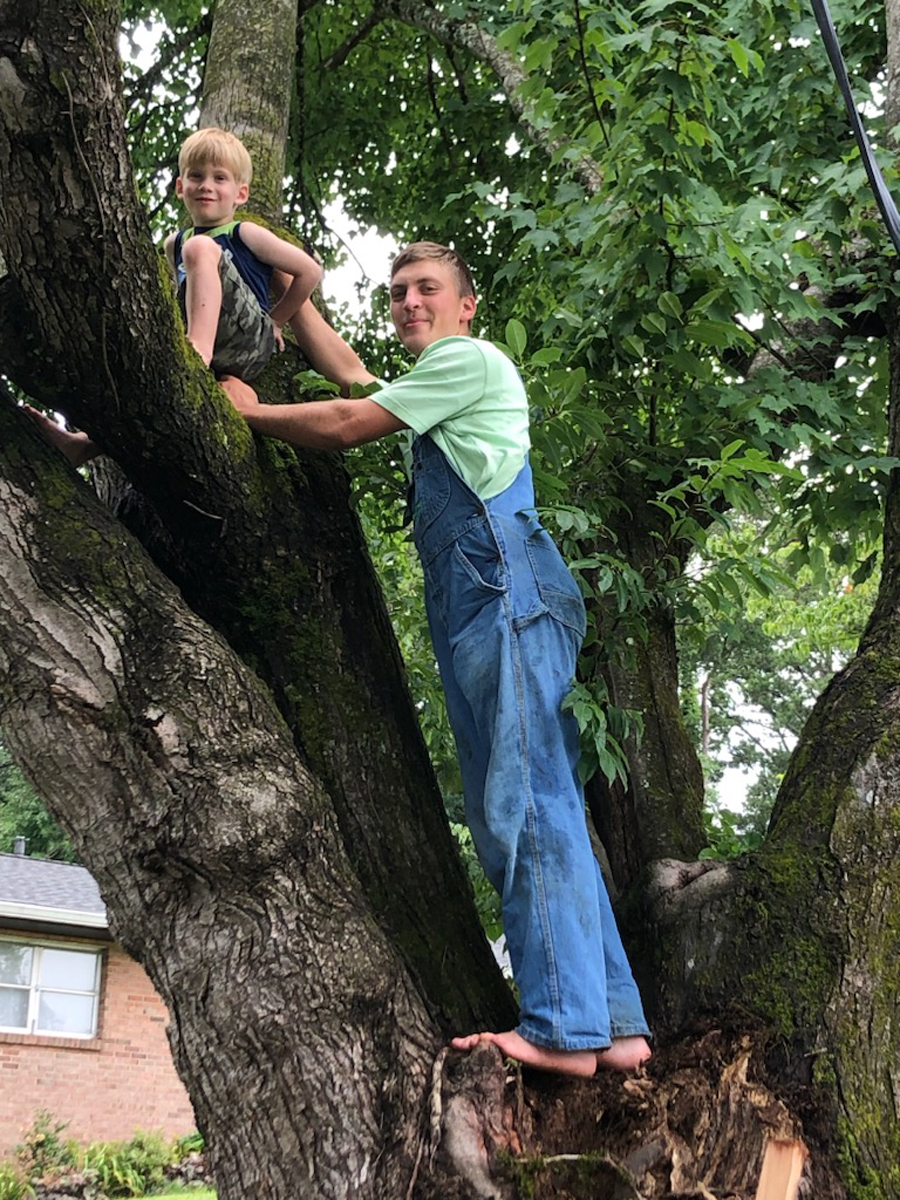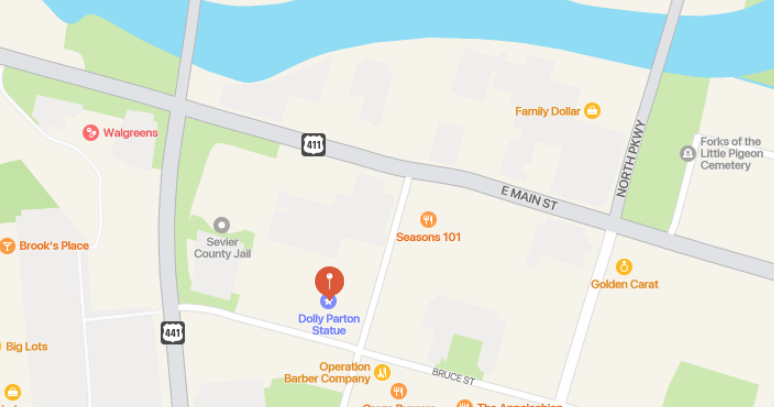
The criminal trial of free-spirited and free-moving Preston Settle, 21, occurs Jan. 11, 2024, in this courthouse. He is on the 9:30 a.m. docket in the circuit courtroom run by Judge Rex Ogle, who’s been trained to despise arguments for freedom and liberty by the Tennessee judicial conference. (Photo Google Earth)

Preston Settle, 21, a devout Christian , takes seriously his duty under God to free himself from slavery and servitude as means arise. (Photo Preston Settle)
“Then I stood on the sand of the sea. And I saw a best rising up out o the sea, having seven heads and 10 honrs, and on his horns 10 crowns, and on his heads a blasphemous name.”
— Revelation 13:1
CHATTANOOGA, Tenn., Tuesday, Jan. 9, 2024 — I plan to attend the criminal trial of Preston Settle in Sevierville, Tenn., 2 hours from my hometown. The reason: His challenge to commercial traffic enforcement has a solid basis and he is a picture of the sort of fighting we must be doing.
By David Tulis / NoogaRadio Network
If we cannot see the solid rock on which he stands, we will be unable to fight similar battles here and know how to resist the greater threats planned against the country and its peace and tranquility. This year promises to highlight a series of coups by national agencies, political parties and state/federal lackeys.
The basis of his fight for the right to freely use his car on the public road has a biblical, constitutional and even natural rights basis. That basis is the right of ingress and egress that we all have from our houses and dwellings. We have an absolute right to get on the road and to go from Point A to Point B without having to ask permission from our domestic commies — aka “local government.” Ingress and egress encompass travel per se. Ingress is the act of “coming in” to the house, the ending of a travel — it punctuation point. Egress starts the trip and describes the act of departing.
Monday night and today pretrial night Mr. Settle is working with his script of questions to ask police officer Eric Werner. “Do you have any evidence you can testify to that you asked for or saw a bill of lading? Is it fair to describe your training as informing you that 100 percent of the use of the road is commercial in nature and is called ‘traffic’?”
Mr. Settle knows that all the evidence must be produced by the prosecutor representing a severely victimized party, state or Tennessee, which by policy taught at Tennessee judicial conferences denies Mr. Settle — and all others in like station — recognition and enjoyment of his using his car to travel and communicate up and down the roads of Tennessee.

Preston Settle takes his criminal prosecution for using his car seriously. (Photo Preston Settle)
The state is charging him with “driving without license” (for which there is no actual charge) and “driving without registration” and “not having insurance,” which the entire legal and political establishment knows means that you must have an insurance policy under § 55-12-101 et al.
These are the 3 legs of commercial government enforcement, the three claims upon which continual stripmining o the people takes place.
As a Christian, says the young man, he has a right under God to serve him and go about his private business on the roads that belong to the people. The police and the sheriff’s department have no authority to blockade him in any way. They have no authority in Tennessee waylay him and seize him as a criminal. He is challenging the process that is in effect a “bill of attainder” forbidden in state and federal constitutions.
The trial is Thursday morning 9:30 AM in the old Sevier County courthouse.
I suggest you break from your routines and go and attend this trial. He is in the courtroom of circuit court judge Rex Henry Ogle.
Why traffic cases are important
Traffic cases are important because they illustrate the operation of presumption by commercial government against the general public, with whom it is in continual war and hostility. Presumption is defeated by a close reading of law and the authority that the officials are using against you, whether these are police and traffic enforcers, or medical authorities demanding that you take a drug or undergo a treatment or enter into a state-approved confinement (also known as concentration camp). If the WHO updates its regulations, its authority to dictate public health measures and media controls against “mal-information” upon Washington and Nashville capitols is entirely presumptive.

I plan to cover the trial Thursday. I urge you to take the day off and attend the trial to support Mr. Settle and witness how commercial government operates slickly, deceitfully and in breach of our constitution. (Photo Google)
If we can understand and defeat traffic, which is a low-cost, low-budget harassment, we can defeat deadly abuses originating from afar, even from the sea itself via maritime or tontine jurisdiction.

Rex Henry Ogle, circuit court judge, Sevier County
“The subject matter of federal law,” he says in a filing, “justly provides that registration of a motor vehicle and license plate requirements for a motor vehicle are necessary when it is contracted for commercial gain. Thus, the right to travel by private conveyance for private noncommercial purposes upon the common way cannot be infringed. No license or permission is required for travel when such travel is not for the purposes of [commercial] profit or gain on the open highways operating under license in commerce. The defendant is not operating in commerce and as such is thereby exempted from the requirement of a license, registration, and insurance.”
I urge you to attend this trial by making a day of it and seeing what happens. Mr. Settle does not expect anyone to care — but I care, and I want you to care about his situation and to be a witness of his efforts. We need to be there so that we can pray over him while in the same star chamber as he and have in our hearts a repentant, humble attitude of regret and shame for our sins personal and national. When I am party to such abuse, my heart sinks and I am highly conscious of my sins, with sorry welling up in my throat.
Mr. Settle has many years ahead of him fighting for liberty of himself, his future family, and his heirs and the people around him in his county. You may also and so we need to learn from him what is a good approach to defeating malicious prosecution under presumption without law.
His case is a vibrant picture of the doctrine regarding one faithful in small things. If he is honest and diligent in the small, shall be not be given authority over cities? If we Americans are faithful in defeating small-scale evils such as crooked police departments and swaggering deputies who exercise surplus violence, might God not use us for greater things, such as forming new countries and kingdoms — ones without a state?
Judge Ogle, who hears the case as a circuit court judge, is a member of the Tennessee judicial conference, of which organization is by law a member. He’s not a member of a lodge, but is a member of the Tennessee Bar Association.
The Tennessee constitution forbids judges from holding a second office of trust. Tenn. const. Art. 6, sect. 7, forbids outside activity. Section 7. “The Judges of the Supreme or Inferior Courts, shall, at stated times, receive a compensation for their services, to be ascertained by law, which shall not be increased or diminished during the time for which they are elected. They shall not be allowed any fees or perquisites of office nor hold any other office of trust or profit under this State or the United States.”
Extensive lawlessness by judges, starting with the chief justice, Holly Kirby, arises from breach of this law. The courts run an internal tax system that abuses pro se litigants and the poor. The conferences are illegally secret, breaching the open meetings act.
The conferences set policy as to how judges will “interpret” and rule on cases such as Title 55, motor and other vehicles. Judicial trickery and legal fictions corrupt rulings such as State v. Booher, 978 S.W.2d 953, 955–56 (Tenn. Crim. App. 1997). Judges deny rights of litigants, refuse evidence, pretermit facts, arrange cases for their friends and abuse defendants and petitioners, with the most explosive results in domestic disputes. Judges accept state-based human trafficking, whether of 15,099 children in so-called “foster homes” or in concentration structures, or in mass false arrests in traffic, drug, FTA and other cases.


The most important words in the article: “Mr. Settle does not expect anyone to care — but I care”. Grace abounds!
THE 7 ELEMENTS OF JURISDICTION
Specifically, before an individual can be charged and convicted with a crime, the government official or agency must prove jurisdiction.
In fact, jurisdiction is almost never even addressed. But to win, jurisdiction MUST be challenged by the individual, and if challenged successfully, the case is dismissed.
There are seven elements of jurisdiction, all of which must be proved by the prosecution if challenged. If not challenged, it will ALWAYS be assumed by the court that competent jurisdiction is proved and accepted by all parties. If any element of the seven is not proven on the record, the case must be dismissed.
If jurisdiction is to be successfully challenged, it must be at the commencement of proceedings, but it can be challenged at any time. To allow the trial to continue at all is to admit to jurisdiction. Below are the seven issues of jurisdiction in any and every court case. Remember, if any one of these seven are not proven beyond a reasonable doubt, the case cannot continue.
1. The accused must be properly identified; identified in such a fashion there is no room for mistaken identity. For stop and identify issues (4th Amendment) see Brown v. Texas, 443 US 47 and Kolender v Lawson, 461 US 352.
2. The statute of offense must be identified by its proper or common name. A number is insufficient. In other words, any charge must affirmatively negate any exception found in the law. Indictment or information is defective unless every fact, which is an element in a prima facie case of guilt, is stated. The assumption of an element is not lawful. Otherwise, the accused will not be thoroughly informed. It is the judge’s job to assure that justice is accomplished.
3. The acts of alleged offense must be described in non-prejudicial language and detail so as to enable a person of average intelligence to understand nature of charge (to enable preparation of defense); the actual act or acts constituting the offense complained of. The charge must not be described by parroting the statute; not by the language of same. The naming of the acts of the offense describes a specific offense whereas the verbiage of a statute describes only a general class of offense. Facts must be stated. Conclusions cannot be considered in the determination of probable cause.
4. The accuser must be named. He may be an officer or a third party. Some positively identifiable person (human being) must accuse. Some certain person must take responsibility for the making of the accusation, not an agency or an institution. This is the only valid means by which a citizen may begin to face his accuser. Also, the injured party (corpus delicti) must make the accusation. Hearsay evidence may not be provided. Anyone else testifying that he heard that another party was injured does not qualify as direct evidence.
5. The accusation must be made under penalty of perjury. If perjury cannot reach the accuser, there is no accusation. Otherwise, anyone may accuse another falsely without risk.
6. To comply with the five elements above, that is, for the accusation to be valid, the accused must be accorded due process. Accuser must have complied with law, procedure and form in bringing the charge. This includes court-determined probable cause, summons and notice procedure. If lawful process may be abrogated in placing a citizen in jeopardy, then any means may be utilized to deprive a man of his freedom. All political dissent may be stifled by utilization of defective process.
7. The court must be one of competent jurisdiction. To have valid process, the tribunal must be a creature of its constitution, in accord with the law of its creation, i.e. (Article III judge). Without the limiting factor of a court of competent jurisdiction, all citizens would be in jeopardy of loss of liberty being imposed at any bureaucrat’s whim. It is conceivable that the procedure could devolve to one in which the accuser, the trier of facts, and the executioner would all be one and the same.
The first six elements above deal primarily with the issue of personal jurisdiction. The seventh element (also element #2) addresses subject matter and territorial jurisdiction. Subject matter jurisdiction is conferred by acts controlled by law; territorial jurisdiction attaches by venue of the parties in relation to the court and to any trans-jurisdictional acts and/or activities of the parties (extended territorial jurisdiction is conferred by controversial long-arm statutes).
SUMMING UP the LAW and the POLITICS
Lacking any of the seven elements or portions thereof, (unless waived, intentionally or unintentionally) all designed to ensure against further prosecution (double jeopardy); to inform court of facts alleged for determination of sufficiency to support conviction, should one be obtained. Otherwise, there is no lawful notice, and charge must be dismissed for failure to state an offense. Without lawful notice, there is no personal jurisdiction and all proceedings prior to filing of a proper trial document in compliance with the seven elements is void. A lawful act is always legal but many legal acts by government are often unlawful. Most bureaucrats lack elementary knowledge and incentive to comply with the mandates of constitutional due process. They will make mistakes. Numbers beyond count have been convicted without benefit of governmental adherence to these seven elements. Today, information is being filed and prosecuted by “accepted practice” rather than due process of law.
See Corpus Juris Secundum (CJS), Volume 7, Section 4, Attorney & client: The attorney’s first duty is to the courts and the public, not to the client, and wherever the duties to his client conflict with those he owes as an officer of the court in the administration of justice, the former must yield to the latter. Clients are also called “wards” of the court in regard to their relationship with their attorneys. After you have read the foregoing, ask your attorney to see a copy of “regarding Lawyer Discipline & other rules”; Also Canons 1 through 9.
Corpus Juris Secundum assumes courts will operate in a lawful manner. If the accused makes this assumption, he may learn, to his detriment, through experience, that certain questions of law, including the question of personal jurisdiction, may never be raised and addressed, especially when the accused is represented by the bar. (Sometimes licensed counsel appears to take on the characteristics of a fox guarding the hen house.)
Jurisdiction, once challenged, is to be proven, not by the court, but by the party attempting to assert jurisdiction. The burden of proof of jurisdiction lies with the asserter. The court is only to rule on the sufficiency of the proof tendered. See: McNutt v. GMAC, 298 US 178. The origins of this doctrine of law may be found in Maxfield’s Lessee v Levy, 4 US 308.
NOTE: The only way such questions jurisdiction will have force and effect is if the general public becomes aware and concerned with justice being based upon law and not just policy based on a facade of law.